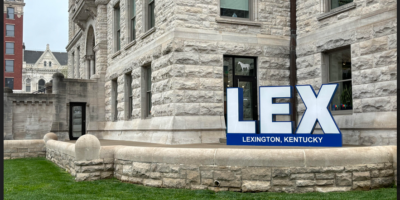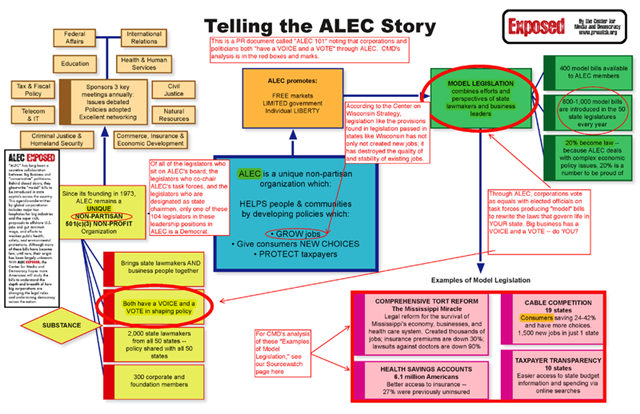By John Hennen
First, some good news. Kentucky Public Radio-Frankfort reported on May 18 that four Democratic Kentucky legislators (Sens. Ray Jones, KY 31; Denise Harper Angel, KY 35; Tim Shaughnessy, KY 19; and Kathy Stein, KY 13) had broken with the American Legislative Exchange Council (ALEC), a conservative network of national and state legislators associated with the attacks against public sector unions in Wisconsin, Indiana, Ohio, Michigan, New Jersey, Florida, and other states.
Now, some bad news. Nearly forty additional Kentucky lawgivers from both parties are still associated with ALEC, including Representative Mike Harmon (R-54) and Senator Tom Buford (R-22), identified by ALEC as Kentucky state chairmen. And, according to a Louisville Courant blog post Kentucky Senate leader David Williams was chosen ALEC’s “Legislator of the Year” for 2011.
The four Democratic Kentuckians’ exodus followed soon after several of ALEC’s major corporate sponsors, including Coca Cola, Pepsi, Kraft, and MacDonald’s, severed ties with the group. The scurrying away was prompted by public exposure of ALEC’s role in drafting the legislative templates for such controversial measures as Florida’s (and several other states’) “Stand Your Ground” law, which effectively condones homicide in the name of individual liberty, and in drafting a wave of anti-democratic voter identification laws, which civil rights activists claim are attempts to deny voting rights to the poor and minorities. Some of ALEC’s corporate donors, responding to the blowback against the “Stand Your Ground” killing of Trayvon Martin in Florida by a gun-toting neighborhood vigilante, decided that promoting the shooting of young black people in hoodies and denying their families access to the ballot was probably not good for business.
Facing the prospect of seeing its allowance cut off by its corporate Sugar Daddies, ALEC retreated from its “social agenda” and announced on April 17 that it was “redoubling our efforts on the economic front, a priority that has been the hallmark of our organization for decades…To that end, our legislative board last week unanimously agreed to further our work on policies that will help spur innovation and competitiveness across the country.” (Press release, available at ALEC.org).
In other words, ALEC is returning to its first principles: demonizing public employees, busting unions with Right-to-Work laws, privatizing public education, and rolling back environmental regulations—all undertaken, of course, to advance the cause of personal freedom.
ALEC’s great American premise
Founded in 1975 as the American Conservative Union, ALEC operates on the great American premise that anything can be bought, including the law. In the late nineteenth-century Gilded Age, railroad corporations routinely bought off legislators with envelopes stuffed with cash, free passes on their lines, and legal business for the many state solons who practiced law. Wined and dined by powerful business tycoons, state lawmakers could see the logic in passing legislation that served their benefactors, and absorbed a set of values that equated corporate success with the public interest. Over time, Progressive, New Deal, and Great Society-era thinking put some regulatory checks on the extreme individualism of the so-called “free market,” promoting a social contract that involved state and national government as mediators between corporate power and the public good. That contract has been under attack by ALEC and like-minded groups ever since, and it has only dramatically escalated since the Reagan era.
ALEC claims to be a member-driven organization, which is technically true but misleading. Its members include dues-paying legislators at all levels of government, but nearly 98% of its operating costs are paid for by corporate donors with long histories or promoting anti-labor, anti-environment, and anti-government crusades for generations. Its corporate donor list includes the infamous Koch brothers ($600,000 in the last decade), the Castle Rock foundation (Coors family), the Olin foundation, and the Allegheny Foundation (Scaife family). Other major donors include Exxon (energy); AT&T (communications); and GlaxoSmithKline, Johnson & Johnson, Pfizer, and PhRMA (pharmaceuticals.) The generosity of these patriotic corporations subsidizes the massive ALEC research and publishing campaigns that accompany the organization’s model legislation crusade, which, according to the Center for Media and Democracy and Sourcewatch.org, has drafted over 800 templates that can be easily adapted to specific legislation coming out of state assemblies.
These model laws are introduced to ALEC’s legislative members at periodic conventions, which cost ALEC about $2 million per year. According to Lisa Graves of the Center for Media and Democracy, the conventions “are a bonanza for marrying state legislators with the wealthy captains of industry (and their lobbyists) at luncheons, dinners, golf outings, skeet shooting, boat rides, cigar smoking parties, and other events to help politicians and corporations bond. The conventions also provide ALEC with a vehicle to indoctrinate legislators with so-called ‘experts’ on issues related to ALEC’s model legislation. Many of these experts are funded by the same group of right-wing corporate foundations that fund ALEC.” ALEC “task forces” are another key investment by the organization, populated by legislators and corporate representatives who meet to discuss ALEC’s model legislation. (For a listing of the “task force” assignments for Kentucky lawgivers, and a list of ALEC’s hired “scholars,” see the ALEC Exposed projects at Sourcewatch.org and CMD.org.)
At this time it cannot be determined to what extent ALEC has directly influenced the proceedings of the Kentucky legislature. Some bills and resolutions during the 2012 session, however, suggest a more than coincidental congruence with ALEC’s model bills. House Bill 77, for example, “An Act relating to charter schools and making an appropriation therefore” includes sections and subsections practically identical to the ALEC model for charter schools. The language in House Continuing Resolution 12, which encourages Kentucky’s national congressional delegation to withhold funds from the United States Office of Surface Mining, and the rhetoric of much of the anti-EPA debate in Frankfort both reflect, if not the direct touch of ALEC, at least the embrace of the ALEC ideal of government acting in service to corporations, rather than the republican principle of corporations in service to the people.
Specific ALEC-tainted model laws have to this point been blocked in Kentucky by popular resistance and the pressure of people’s lobbying. Right-to-Work laws, privatization of public schools, draconian voter identification statutes, ad infinitum, have yet to succeed in Kentucky. But their advocates pepper our legislature, and ALEC awaits its chance, just as it did in Wisconsin, Ohio, and Indiana. The core philosophy of ALEC can be summed up in a passage from The Gardens of Democracy: A New American Story of Citizenship, the Economy, and the Role of Government by Eric Liu and Ric Hanauer, 2011): “We have convinced ourselves that a million individual acts of selfishness magically add up to a common good.” Kentucky deserves better than that.
In next month’s column I will more closely examine that ideology of self above all, which ALEC claims is Jeffersonian but has more in common with the self-worshipping lunacy of Ayn Rand.





Kathy W. Stein
I am very pleased that ALEC’s agenda and funding have come to light for the public to consider. I was unaware that I had been removed from the membership. Both Sen. Harper-Angel and I will miss getting our email alerts we regularly received from them, but their exposure has made them less open with their information.
Happily I remain on the rosters of a couple of other interesting organizations of whack jobs.
curtis morrison
Just saw this, I’m impressed. Thanks for the shout-out to my work in Louisville Courant. Minor clarification- I don’t think I ever determined which year Williams received the ‘legislator of the year’-award, only that he bragged about receiving it.